Smelly earwax isn't just unpleasant; it can be a sign of underlying issues. Factors like ear infections, blockages, or even genetic traits influence the odor. Wet earwax tends to emit stronger scents, especially in certain ethnic groups. You might also experience symptoms like hearing loss, tinnitus, or discomfort in your ears. Regular ear care is crucial to prevent excessive buildup and infections. So, if you've noticed an odd smell, don't ignore it. Taking action is important for your ear health and comfort. There's plenty more to discover about how to manage earwax effectively.
Key Takeaways
- Smelly earwax can indicate underlying issues like ear infections, blockages, or swimmer's ear, requiring medical attention.
- The ABCC11 gene influences earwax type and odor, with ethnic variations affecting smell intensity.
- Excessive earwax buildup can lead to hearing loss, tinnitus, and increased risk of infections.
- Maintaining ear hygiene and avoiding cotton swabs can prevent odor-causing blockages and infections.
- Consult a healthcare professional for safe earwax removal if experiencing foul-smelling discharge or discomfort.
Causes of Smelly Earwax
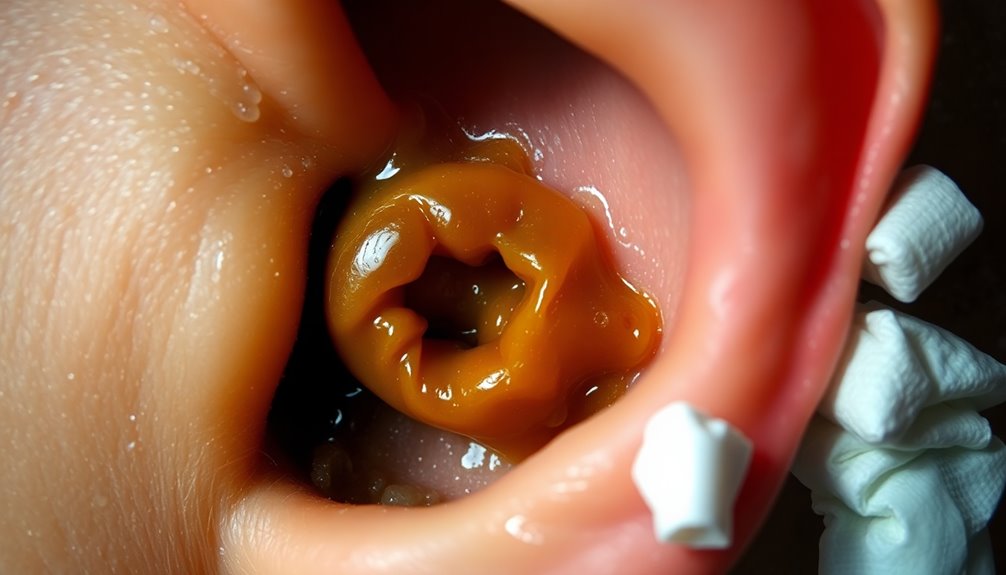
Smelly earwax can be an unpleasant issue, often signaling an underlying problem. One common cause is ear infections, which can arise from bacteria, fungi, or viruses. Symptoms like pain, itching, and discharge can lead to pus and a foul odor. You might also experience difficulty hearing and earaches, often accompanied by a fever.
Blockages and foreign objects can also contribute to smelly earwax. Excessive earwax buildup or items like beads, small toys, or insects stuck in your ear can cause pain, hearing loss, and infection. Trying to remove these objects with cotton swabs can worsen the situation, leading to trapped debris and unpleasant odors.
Swimmer's ear is another potential culprit, typically caused by trapped water in the ear canal. This condition results in a bacterial infection, leading to symptoms like itching, redness, and pus. You may feel like your ear is underwater and experience trouble hearing, often alongside smelly earwax and fever.
Other conditions, like cholesteatoma or even rare cases of ear cancer, can also result in foul-smelling earwax. Identifying the cause is crucial for effective treatment, which may involve antibiotics, eardrops, or surgery. Regular monitoring of ear health is essential to catch any potential issues early and maintain overall auditory function.
Genetic Factors Influencing Odor
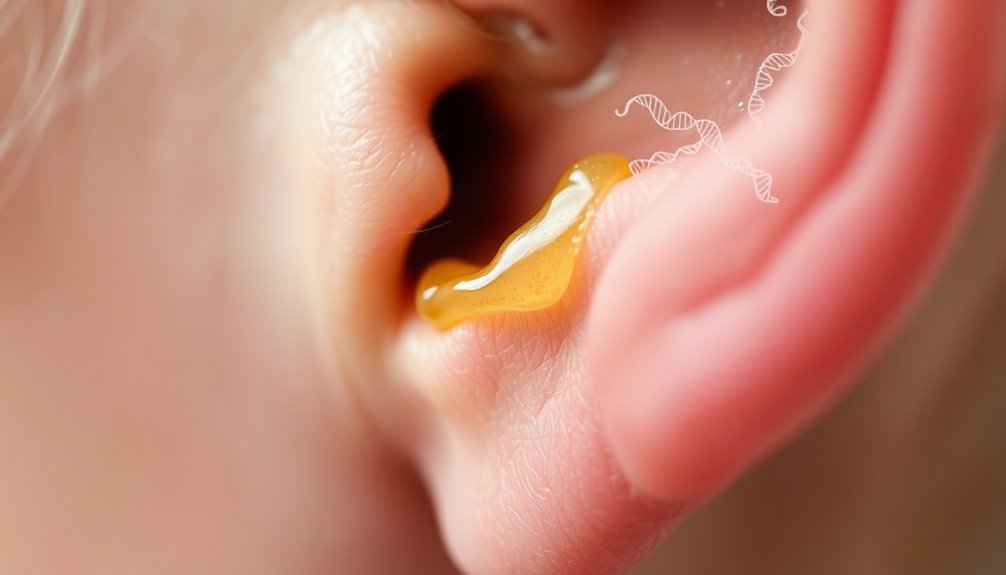
Genetic factors play a significant role in determining the odor of earwax, primarily influenced by the ABCC11 gene. This gene dictates whether you have wet or dry earwax, and it's tied to odor production. If you have the dominant allele, you're more likely to have wet earwax, which is common among Caucasians and Africans. Conversely, the recessive allele, associated with dry earwax, is prevalent in East Asians and Native Americans.
The type of earwax you produce also correlates with the amount of volatile organic compounds (VOCs) present. Studies show that Caucasian earwax typically emits stronger odors compared to the relatively milder scent from East Asian and Native American earwax. This genetic diversity can stem from interethnic marriages and global migration patterns, leading to a mix of earwax types within families. Additionally, the presence of emotional dysregulation in individuals with certain genetic traits can influence overall health and well-being.
Moreover, the ABCC11 gene is linked to underarm odor, suggesting that those with wet earwax might experience more intense body odor. Additionally, certain genetic predispositions may also play a role in unilateral hearing loss, indicating how our genetics can influence multiple aspects of our health. Understanding these genetic factors not only sheds light on earwax odor but also reflects broader aspects of human migration and ethnicity.
Different Types of Earwax

Earwax comes in various types, each with distinct characteristics that can indicate your ear health. You may notice soft, yellow earwax, which is the most common and healthiest type. This indicates new wax production and is generally a sign of healthy ear function. On the other hand, firm, brown earwax suggests older, possibly hardened wax. If you notice this, especially if you have symptoms, it might be time to consult a professional.
Flaky, pale earwax is another type that shows a healthy self-cleaning mechanism in your ears. It resembles tiny flakes and isn't a cause for concern. Conversely, hard earwax feels like a little rock and can be trickier to remove. This type may lead to hearing issues if it becomes impacted. Interestingly, the consistency of earwax is influenced by genetic background, which affects whether someone may have wet or dry earwax.
You might also find wet earwax, which is sticky and more common among certain ethnic groups. In contrast, dry earwax is crumbly and light-colored, often found in others. Lastly, runny or liquid earwax can indicate a more serious issue, especially if it follows swimming or diving. Always seek medical advice if you're concerned about any changes.
Health Implications of Earwax
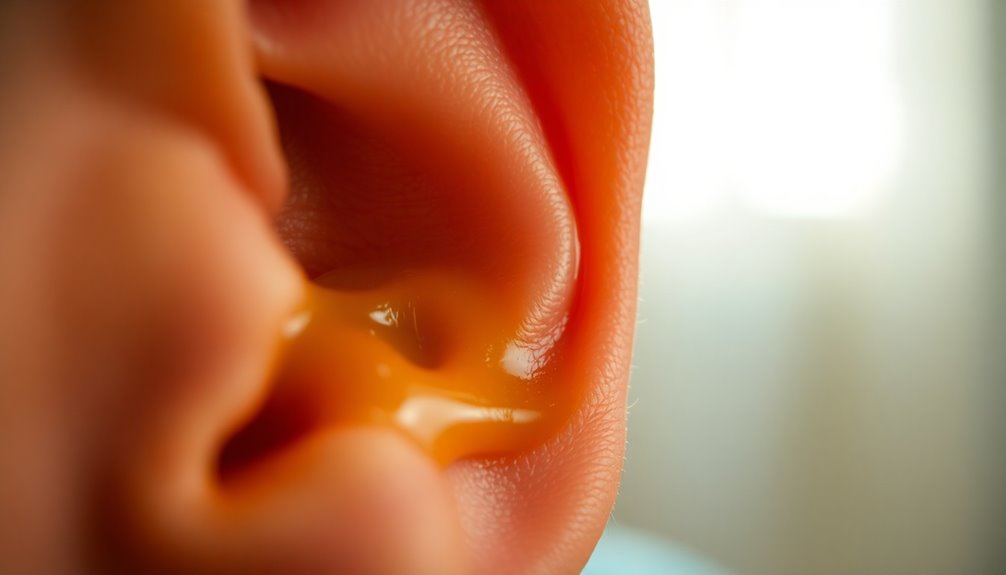
Understanding the health implications of earwax is crucial for maintaining your overall ear health. When earwax builds up, it can block your ear canal, leading to muffled hearing or even complete hearing loss. You might also experience tinnitus, which is that annoying ringing in your ears. In addition to these auditory issues, you may face ear pain, itchiness, or dizziness, all caused by the pressure of impacted wax.
Moreover, excessive earwax increases the risk of infections, including bacterial and fungal types. If an infection develops, you could experience severe symptoms like high fever, vomiting, and lethargy. In some cases, untreated infections can escalate to serious conditions like mastoiditis or even life-threatening complications such as meningitis. Approximately 10% of children and 5% of adults experience impacted earwax, highlighting the widespread nature of this issue.
Lastly, the protective function of earwax diminishes when it's impacted, leaving your ears vulnerable to bacteria and viruses. Attempting to remove earwax at home might lead to further issues, such as eardrum puncture or permanent hearing loss. Regular check-ups with a healthcare professional can help you avoid these complications and maintain optimal ear health.
Accompanying Symptoms to Watch
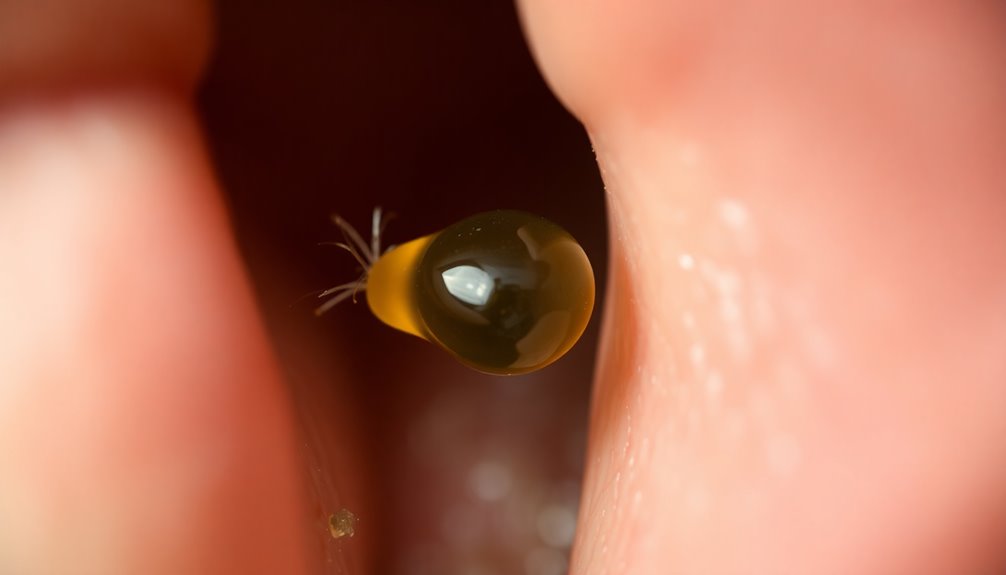
Watching for accompanying symptoms is essential when dealing with earwax buildup or related issues. If you're experiencing earache, difficulty hearing, or a feeling of fullness in your ear, it's a sign that excessive earwax may be blocking your ear canal. Itchiness in the ear is another common symptom that can indicate a buildup. Additionally, excessive moisture in the ear can contribute to bacterial growth, worsening the symptoms.
In some cases, you might face an ear infection. Look out for ear pain, especially in children who may tug on their ear or act grumpy. If you notice trouble sleeping or a fever above 100.4˚F (38˚C), seek medical attention.
If you suspect a foreign object in your ear, you could experience pain, hearing loss, or even an unpleasant odor. It's crucial to address these symptoms immediately to prevent infection.
Swimmer's ear and other conditions can also present symptoms like itching, redness inside the ear, and mild discomfort. You might notice pus or have trouble with balance. By paying attention to these accompanying symptoms, you can take timely action and avoid more serious complications with your ear health. Don't ignore these signs; they're your body's way of signaling something needs attention.
Care and Treatment Options
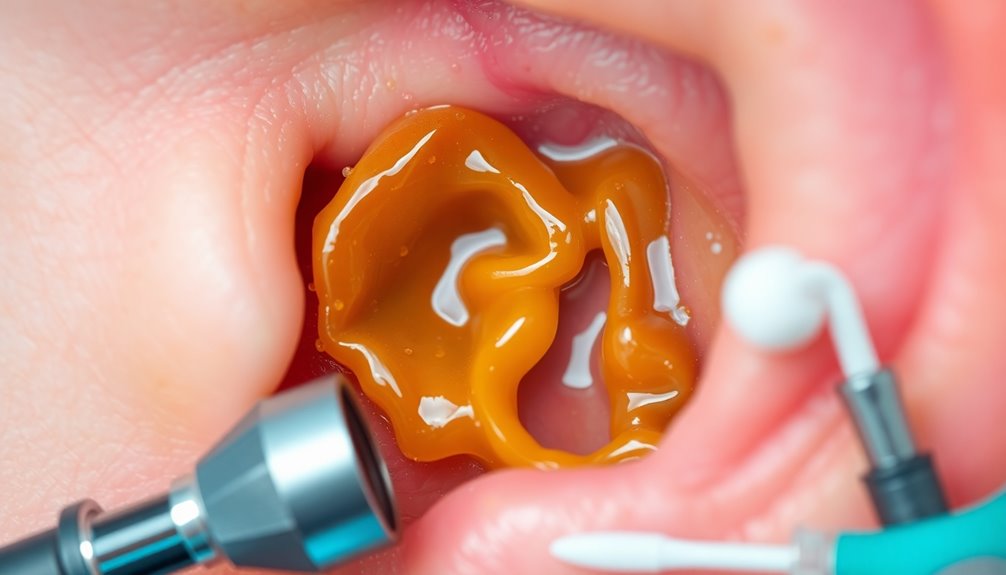
When dealing with smelly earwax or related issues, knowing how to care for your ears and treat any problems is crucial. Start by keeping your ears dry. After swimming or bathing, use petroleum jelly around your ear openings to block water entry, and consider using a hairdryer on a low setting to dry out the ear canal. If you notice any discharge, especially colored and foul-smelling, consult a doctor as this may indicate an ear infection. Antibiotics like amoxicillin may be necessary, so don't self-medicate.
For wax buildup, try softening drops such as glycerine or hydrogen peroxide mixed with water. Ear wax functions as a protective barrier, so applying a few drops into your ear canal and allowing them to sit for a few minutes before gently syringing the ear can help. Over-the-counter ear wax removal kits can also help clear excess wax effectively.
Natural remedies, including olive oil or tea tree oil, are good alternatives for softening wax. Remember, avoid inserting cotton swabs into your ears, as this can cause damage. Regularly check your ear health and take preventive measures to keep smelly earwax at bay.
Frequently Asked Questions
Can Diet Affect the Smell of Earwax?
Yes, your diet can definitely affect the smell of your earwax. Consuming dairy, gluten, caffeine, and high-sugar processed foods may increase earwax production, leading to a stronger odor. On the other hand, incorporating omega-3 fatty acids and staying hydrated can help reduce inflammation and maintain a healthier ear environment. By adjusting your diet, you can manage earwax consistency and minimize any unpleasant smells that may arise.
How Often Should I Clean My Ears?
How often you should clean your ears depends on a few factors. If you have normal wax production, once a year might be enough. If you're prone to wax build-up, consider cleaning them every six months. For hearing aid users or those with excessive wax, quarterly cleanings are often necessary. Pay attention to symptoms like muffled hearing or fullness, as they can indicate it's time for a cleaning. Always consult a professional for personalized advice.
Is It Normal for Earwax to Change Color?
Yes, it's normal for earwax to change color. Fresh earwax usually appears off-white to yellow, while older earwax can turn brown or dark orange. Various factors like age, genetics, and health can influence these changes. However, if you notice yellow-green or runny earwax with a foul smell, it might signal an infection, and you should seek medical attention. Pay attention to any significant changes, as they could indicate an underlying issue.
Can Stress Impact Earwax Production?
Yes, stress can impact earwax production. When you're stressed, your body releases cortisol, which can stimulate the sebaceous glands in your ear canal to produce more wax. If you have oily skin, you might notice even more wax buildup during stressful times. This excess earwax can lead to discomfort, itching, and even temporary hearing issues. Staying mindful of your stress levels and managing them can help reduce excessive earwax production.
Are There Any Home Remedies for Smelly Earwax?
If you're dealing with smelly earwax, there are effective home remedies you can try. You can use baby oil, hydrogen peroxide, or mineral oil to soften the wax. Apply a few drops into your ear and let it sit for a few minutes. After softening, use a rubber syringe with warm water to gently rinse it out. Remember, avoid using cotton swabs, as they can push wax further in and worsen the odor.
Conclusion
In summary, dealing with smelly earwax isn't just a nuisance; it can signal underlying health issues. By understanding its causes, recognizing accompanying symptoms, and knowing when to seek treatment, you can take control of your ear health. Don't hesitate to practice good ear hygiene and consult a healthcare professional if you notice persistent odors or discomfort. Remember, your ears deserve the same care as the rest of your body, so keep them clean and healthy!









